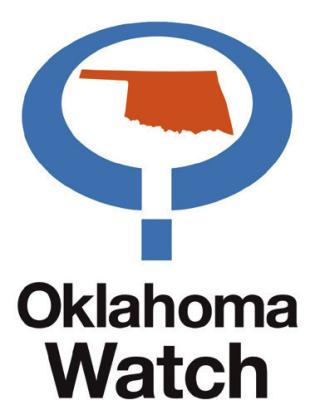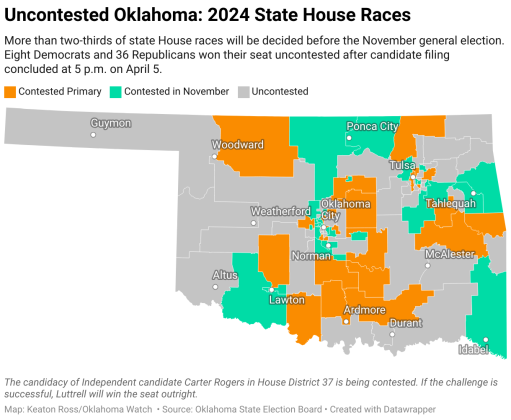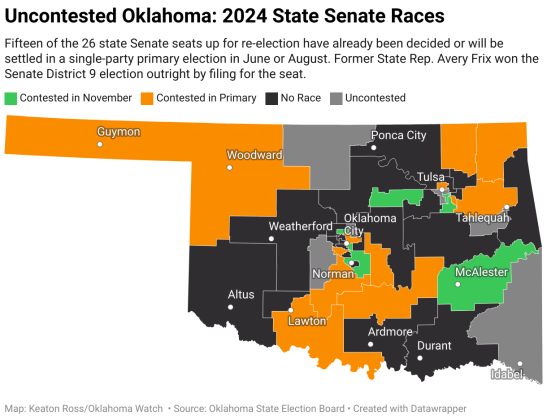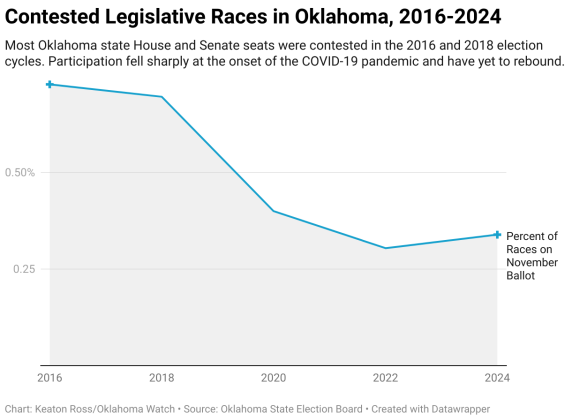For the third consecutive general election cycle, most Oklahoma voters won’t elect their state lawmakers in November.
Fifty of the 127 State Senate and House seats up for re-election were decided at 5 p.m. Friday, April 5, when just one candidate filed for office. Thirtyfive races will be settled in the June 18 primary or Aug. 27 runoff election. The Oklahoma Democratic Party has opened its 2024 primaries to independents while the Republican and Libertarian parties will hold closed contests.
Former Rep. Avery Frix, who vacated his House seat in 2022 to run for Congress, won the Senate District 9 election outright when no one filed to run against him. Outgoing Sen. Dewayne Pemberton, who announced in February he would not seek reelection, faced a Democratic challenger in both his 2016 and 2020 campaigns.
After a record number of candidates filed for office during the 2018 teacher walkout, party leaders blamed the COVID-19 pandemic on a lackluster showing in 2020. When nearly 70% of races did not appear on the November ballot in 2022, with several Republicans winning previously competitive districts outright, Democratic party officials blamed the Republicandominated Legislature for making districts less competitive during redistricting.
Uncompetitive races can cause voters to become apathetic and less interested in the democratic process, studies have found. A 2011 Georgetown University study found state legislators who run unopposed tend to be less effective and engaged with constituents.
Brett Sharp, a political science professor at the University of Central Oklahoma, said the increasing nationalization of local politics and the rising political spending has made it more difficult for Democrats to be competitive in rural areas. Running a competitive campaign in a House district with about 39,000 residents can cost tens of thousands of dollars.
Voter apathy and increased odds of political corruption are among the top consequences of uncompetitive races, Sharp said, referencing political scandals in the early 1990s when Democrats controlled the state.
“Part of democracy is participating and feeling like you have a say,” Sharp said. “When it gets down to one party dominating race by race and people aren’t even showing up on the ballot and are automatically placed into office, it has an effect on us as citizens.”
Lawmakers and voter advocates have floated several changes, including retention ballots and open primaries, as solutions to make elected officials more accountable to voters.
House Bill 1917 by Rep. Andy Fugate, D-Del City, would place unopposed legislative candidates on a retention ballot each general election cycle and automatically call a special election if they do not receive at least 51% of votes. The measure, which was introduced last session, did not receive a hearing in the House Rules Committee and is effectively dead.
Supporters of an effort to establish open primaries in Oklahoma, which would place candidates of all parties on the June primary election ballot with the top two advancing to the general election, say they are making progress towards collecting signatures for an initiative petition. If the system was in place this year, more than 60% of legislative races would be decided in November.
Supporters of open primaries argue the method gives more power to independents, who account for about 20% of Oklahoma voters, and moderates campaigns.
“I think the most vital aspect of it is that everyone votes, so you’re incentivized whether you have an R, a D or nothing behind your name to build a coalition with people beyond parties,” said Oklahoma City Mayor David Holt, who served as a Republican state senator in Senate District 30 from 2010 to 2018, at a November panel on repealing closed primaries.
Critics, including members of Gov. Kevin Stitt’s Election and Campaign Finance Task Force, contend open primaries too often result in two candidates with similar views advancing to the general election.
“Such a primary system can have the effect of reducing options for voters despite its intent, and any unintended consequences should therefore be cautiously contemplated before it is instituted in Oklahoma,” the report reads.
U.S. House Seats, Corporation Commission opening draw dozens of candidates All five members of Oklahoma’s congressional delegation filed for reelection, with four drawing a challenger from an opposing party.
Registered Republicans will decide Oklahoma’s Third Congressional District race, where two Republicans filed to run against incumbent Rep. Frank Lucas. In 2021, Oklahoma lawmakers expanded the mostly rural district to include portions of urban Oklahoma City.
Three Republicans, Democrat Harold Spradling and Libertarian Chad Williams filed to succeed longtime Corporation Commissioner Bob Anthony, who faces a term limit. Former Secretary of State and Senate President Brian Bingman, former journalist Russell Ray and welder Justin Hornback will face off on June 18 for the Republican party’s nomination.
Oklahoma Watch, at oklahomawatch.org, is a nonprofit, nonpartisan news organization that covers public-policy issues facing the state.




